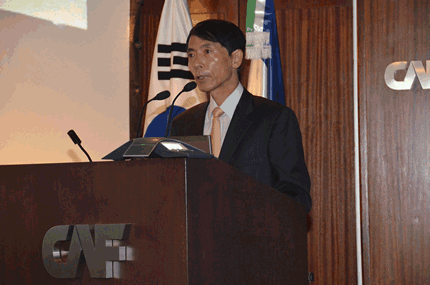
Comprehensive Management of Residues and Solid Waste: Korea’s experience
The Embassy of the Republic of Korea in Venezuela, and CAF, Development Bank of Latin America, organized a forum that addressed the issue as an important problem at a global scale.
(Caracas, November 2013). The forum Gestión Integrada de Residuos y Desechos Sólidos (Comprehensive Management of Residues and Solid Waste) took place in Caracas, at the Headquarters of CAF, Development Bank of Latin America. This event was organized by the financial institution and the Embassy of the Republic of Korea in Venezuela.
The opening words were in charge of CAF's Executive President, and the Ambassador of the Republic of Korea in Venezuela, Joo-teck Kim, who presented a vision of the comprehensive management of residues and solid waste, as well as the opportunities for cooperation and exchange of knowledge and experiences to improve the quality of the environment.
CAF's Executive President highlighted Korea's efforts in favor of the environment and sustainable development. "I have great admiration for that country and all its advances in past decades, establishing a long term agenda with an emphasis on key issues for its development".
During the development of the forum, the importance of innovation in green management as an efficient mechanism to recover the energy coming from solid residues was highlighted, as it guarantees an adequate and sustainable of the residues that cannot be reused or recycled.
CAF's Executive President finalized by saying that "it is in the local sphere where concerns are awakened, as the problems are real and, it is there ‒where creative individuals and institutions emerge‒, that public policies, public-private associations, enterprises, technological associations, and economies that respect the environment should be created".
Joo-teck Kim stated that "this forum is the manifestation of the strong will and disposition of CAF and the Republic of Korea to work in the solution of one of the main challenges affecting the continent's large urban areas" while offering technical support to face the challenges of climate change and contribute to sustainable development.
The day's sessions focused around issues such as policies for the transformation of residues into energy; eco-innovation and eco-technologies for green energy and transformation of residues into energy in Latin America, local management, where the cases of South Korea and Venezuela were presented, financing mechanisms, and the role of development banking in this area.
Panelists that stood out included Lee, Seon-Woo, Director of the Division of Transformation of Residues into Energy, Office for the Recycling of Resources of the Ministry of the Environment in Korea; Kim, Ki-Tae, Executive Director at Hyundai Engineering & Construction Co.; Vladimir Valera, consultant and teacher at the Metropolitana and Simón Bolivar universities; Lee, Hyun-Hee, Head of the Surveillance Team for the Stationary Contamination of the Air, Department of Air Monitoring, Korean Environment Corporation; Tito Bonadonna, Development and Business Manager of Otepi; Carolina España, Director of International Financial Resources at CAF; and Alejandro Miranda from the Latin American Climate Change Program, among other high level panelists.
CAF's more recent content

CAF, ECLAC, IDB and PAHO Promote Sustainable Development in the G20
The Regional Organizations of the Americas congratulate Brazil on its successful G20 Presidency, highlighting its leadership on key issues such as poverty, governance, and climate change. They also reaffirm their commitment to actions that promote equity and development in the region.
Urgent Call for Action to Safeguard Caribbean SIDS at CAF Symposium
As the global community grapples with the escalating climate crisis, Caribbean Small Island Developing States (SIDS) are running out of time to secure critical investments and support needed to strengthen their economies and protect vulnerable communities from the intensifying impacts of climate change. With the window to take decisive action rapidly shrinking, CAF - Development Bank of Latin America and the Caribbean, in partnership with the Commonwealth Secretariat and the Antigua and Barbuda High Commission, brought together key stakeholders for a symposium in London to address the critical vulnerabilities Caribbean SIDS face.